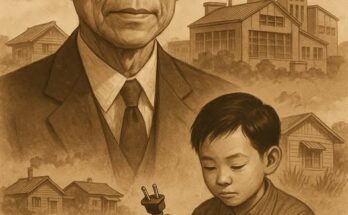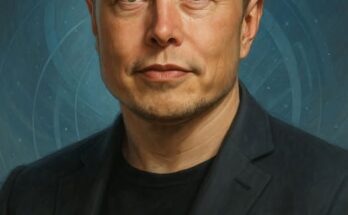Chapter One: The Man Behind the Noise
By 2015, Jack Ma had already achieved what most entrepreneurs only dream of. As the co-founder and public face of Alibaba, he had turned a humble startup from his apartment in Hangzhou into one of the most powerful tech empires in the world. His face had become synonymous with success in modern China — a fusion of charisma, vision, and relentless energy.
But behind the smiles and speeches, behind the IPOs and boardroom negotiations, there was something deeper stirring in Ma. A hunger not for more power or more profit — but for less. Less noise. Less spotlight. Less velocity. What Jack Ma craved, quietly and perhaps even privately, was space.
Not space in the business sense — not market share or territory. But real space: acres of pine and birch. Hills that rolled like old hymns. Rivers that whispered instead of roared. Space where cell signals faded and human ambition bent gently before the wisdom of trees.
In a move that surprised many but made perfect sense to those paying close attention, Jack Ma purchased Brandon Park — a 28,100-acre expanse nestled deep within New York’s Adirondack Mountains. For $23 million, he didn’t acquire another mansion or a technological stronghold. He acquired stillness.
Brandon Park wasn’t just a real estate investment. It was an act of preservation — both for the land and for himself.
Chapter Two: Brandon Park — A Land With a Legacy
Long before Jack Ma’s name was etched onto the deed, Brandon Park carried a different kind of legacy. The land had once belonged to the Rockefellers, one of America’s most storied families. In their hands, the land was managed with a reverent philosophy — one that prized stewardship over exploitation. The forest wasn’t just something to harvest. It was something to protect.
Situated within the six-million-acre Adirondack Park — the largest protected area in the contiguous United States — Brandon Park is more than forest. It is a mosaic of mountain, meadow, and water. It boasts a 2,200-foot peak, vast coniferous forests, and over nine miles of trout streams and ponds, home to native species of brook trout. It is a rare, nearly untouched stretch of northeastern wilderness, the kind of place where time slows down — or even disappears altogether.
It’s easy to imagine why Ma was drawn to it. In a world where most billionaires measure wealth in terms of skyscrapers and fleets, Ma chose something quieter. Something older. Something humbler.
Chapter Three: Why a Man Like Ma Turns to Nature
To outsiders, Jack Ma’s purchase might seem odd. After all, this is a man who stood on the global stage — giving TED Talks, rubbing shoulders with world leaders, and commanding the kind of influence that rarely pairs with rustic retreats.
But those who have followed Ma’s personal journey understand that he has always been more philosopher than tycoon.
Before founding Alibaba, Jack Ma failed repeatedly — rejected by jobs at KFC and Harvard alike. He once described himself as a “nobody” with bad math and no technical skills. But what he lacked in pedigree, he made up for in vision. And throughout his rise, he never lost touch with a kind of poetic soul — a teacher’s heart, rooted in reflection rather than ambition.
Nature, then, was not an escape. It was a return.
Brandon Park offered Ma a rare kind of solitude — the kind that cannot be scheduled, bought, or built. It had no board meetings, no quarterly reviews. Only wind. Only silence.
For someone who had spent decades climbing the noisy ladders of global capitalism, this wilderness offered a ladder of a different kind — one that pointed inward, and downward into the soil.
Chapter Four: No Mansions, No Yachts — Just Trees
What’s striking about Jack Ma’s retreat into Brandon Park is not just that he bought it, but what he didn’t do with it.
There were no grandiose development plans. No sprawling private resorts. No luxury lodges cut deep into the forest. Instead, he preserved the land much as it was. He chose, deliberately, to leave it untouched — a living counterpoint to the idea that wealth must always be loud.
It’s a deeply Confucian choice, one echoing traditional Chinese values of harmony between man and nature. In some ways, Ma’s decision aligns more with the spirit of ancient poets than with modern CEOs.
Like the Tang Dynasty’s Wang Wei, who wrote of pine forests and empty mountains, Ma found peace not in conquering the world, but in quietly observing it. In protecting it.
In buying Brandon Park, Jack Ma didn’t just make a purchase. He made a statement — one that says the wild has value beyond its economic utility. That trees have worth even when they are not turned into furniture. That real wealth might be measured in how much land you choose not to change.


